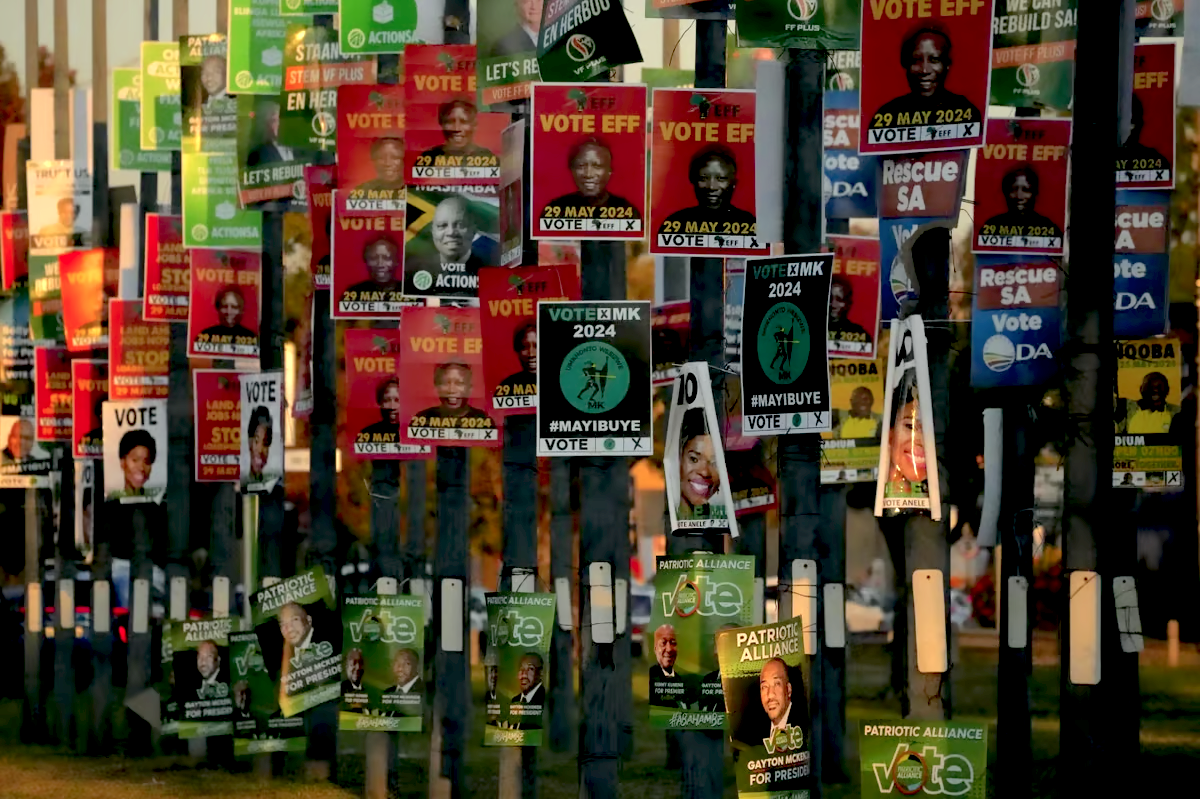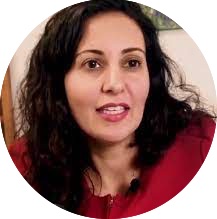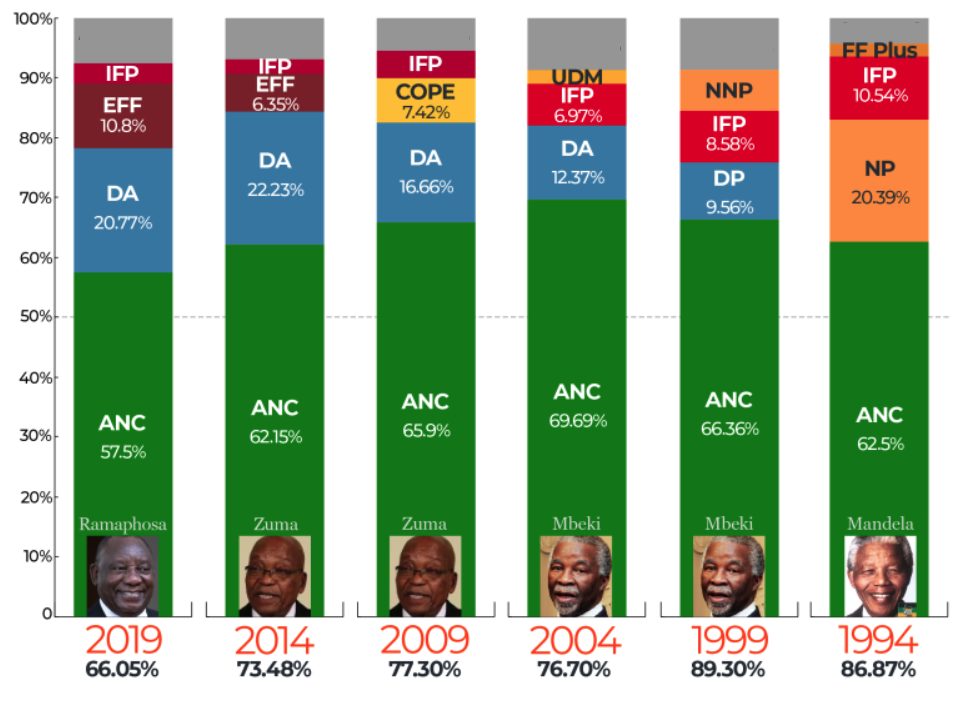
Published 05/28/2024 18:04 | Edited 05/28/2024 19:09
This Wednesday (29), South Africans will head to the polls for elections at national and provincial level. It will be the 7th general election since the end of apartheid in 1994, when Nelson Mandela was elected president with the African National Congress (ANC) winning 62.5% of seats in parliament. Three decades after this historic milestone, the ANC faces a much more challenging scenario with the natural wear and tear of 30 years in power. To analyze this scenario, the Red Portal consulted Ana Prestes, international analyst and secretary of International Relations at PCdoB, and Flávia Loss, professor of International Relations at the São Paulo School of Sociology and Politics Foundation (FESP-SP).
Since 1994, the ANC has dominated South African politics, but its support has declined over the years. Currently, the party has 230 of the 400 seats in parliament, but is facing difficulties in maintaining this majority in the next elections. “The ANC’s situation is no longer so comfortable in the elections and it will have great difficulty obtaining more than 50% of the seats in the national parliament on its own,” comments Ana Prestes.

The need for alliances, possibly with the second most voted party, becomes an imminent reality. The problem is that the second most voted party, currently with 21% of Congress, has been the Democratic Alliance, the only party led by a white man, John Steenhuissen, which South Africans understand as a party that vocalizes the interests of this minority. The right-wing party has fought against the quota policy for black people, for example.
With a population of 62 million people, of which 27.7 million are registered to vote, South Africa will see an election marked by diversity. This election will also be historic as it allows for the first time the participation of independent candidates, not affiliated with any political party, which in itself expresses some of the disillusionment with the dominant parties.
South Africa’s electoral management body, the IEC, has authorized 14,889 candidates, including 70 political parties and 11 independents, to contest 887 seats in the May vote. Whoever reaches more than 50% of the votes decides who will be the country’s president, who is generally the party’s main leader. If the ANC secures more than 50% of seats, President Cyril Ramaphosa, 71, will most likely be re-elected as president to serve his second and final five-year term.
See how the growing power of the African National Congress party in the first elections has been gradually falling, with chances of its biggest loss of votes in this election, according to opinion polls:

Disillusionment and unemployment
The growing lack of interest among young people is the highlight for Professor Flávia, who observes the transformations in the electoral landscape and the influences that dominate the choices of young voters.

“We are very used to seeing South Africa always supported by Mandela’s legacy. Now what we see is a different situation”, explains Flávia. Although Nelson Mandela remains an iconic figure in the country’s collective memory, new generations are demonstrating a gradual distancing from this historic leadership. “Around 42% of the electorate for Wednesday’s elections are under 40 years old,” she notes, highlighting the predominance of young people among voters.
Flávia refers to the detached view that young people who never knew apartheid have of Mandela himself and his party, the ANC. It is common for these young people to revere the mythical figure of the anti-apartheid leader with reservations, lamenting the fact that he “ceded too much” to the country’s white elite. To date, no substantive agrarian reform has been made in the country, for example, which means that wealth is still concentrated in the hands of this minority of 8% of the population.
Young South Africans face challenges that go beyond politics, such as an alarming unemployment rate that exceeds 30%, meaning one out of every three South Africans is unemployed due to the low industrialization of the economy after apartheid. The problem is particularly serious among young people aged between 15 and 34. Unemployment in this group is 45.5%, higher than the national average.
The general population also faces problems in the health system, underfunding of education, increasing violence, constant electricity blackouts, difficulties in accessing water and housing in shacks for around 20% of citizens. “With such a high unemployment rate, you can’t think about what your life will be like in the future,” comments Flávia. This scenario contributes to a widespread feeling of hopelessness and disillusionment with the political process so many years after defeating the apartheid regime.
Social networks: a new arena of influence
This phenomenon is not unique to South Africa. Lack of enthusiasm and hopelessness regarding politics are trends observed in many parts of the world. “This has been happening all over the world, so it wouldn’t be any different in South Africa with this youth,” says Flávia.
Social media is emerging as a significant force in the attempt to mobilize young voters. “The influence of social networks is a phenomenon worthy of mention,” highlights Flávia. Candidates from different political spectrums, including the Communist Party and the Democratic Alliance, are investing in online campaigns to attract young voters.
However, despite these efforts, surveys and conversations in the South African media indicate persistent low adoption among young people. “Even so, you feel in the research, in the conversations, in what has been reported by the South African media, a lack of interest, a very strong discouragement,” she points out.
The challenge of preserving democracy
The loss of trust in democracy is one of the most worrying aspects of this scenario. “Thinking about South Africa, a hard-won democracy, a democracy built with a lot of effort,” emphasizes Flávia, highlighting the importance of preserving this legacy.
The detachment of youth from the figure of Mandela and the importance of democracy is alarming. “It’s a little scary for young people to separate themselves from this image, that regardless of what is happening, the preservation of this democracy is very important,” concludes the professor.
As South Africa prepares for elections, the biggest challenge may not just be who gets elected, but how to regain young people’s trust and engagement in democracy and the country’s future.
Ana Prestes highlights five main parties in the race to win a majority in the national parliament:
- ANC (African National Congress) – The dominant party since the end of apartheid.
- DA (Democratic Alliance) – Main opposition party, representing mainly the white minority and with a right-wing liberal line.
- MK (Umkhonto we Sizwe) – Party founded by former president Jacob Zuma, strong in the KwaZulu-Natal region that debuts in the dispute.
- EFF (Economic Freedom Fighters) – Led by Julius Malema, with a more left-wing speech and 11% of the seats.
- IFP (Inkhata Freedom Party) – Another significant political force in the electoral scenario with 3.5% of seats.

Economic and social impacts
The erosion of support for the ANC is attributed to a combination of factors, according to the PCdoB leader. Unresolved economic and social problems, coupled with corruption scandals, such as those involving Jacob Zuma, have weakened popular confidence. “The economic and social problems that have not been resolved and the cases of corruption involving government officials, especially with the fall of Jacob Zuma, contributed greatly to this,” explains Ana Prestes.
Interestingly, many of the ANC’s current rivals are figures who were once within the party. Jacob Zuma, who now leads MK, and Julius Malema, who founded the EFF after breaking with the ANC, exemplify this dynamic. “Zuma himself and Julius Malema from the EFF, who is a leader who comes from the party’s youth and broke away from a more left-wing discourse,” highlights Ana.
Appeal to the working class
The South African Communist Party (SACP), a traditional ally of the ANC, has appealed to the working class to support the party in the upcoming elections. “Let us do everything possible to vote for the ANC. Let us unite with strength and purpose, raise our voices through the power of voting and leave our mark for democratic transformation and development for all,” says the SACP note.
The party highlights advances made under ANC rule, such as human rights, access to housing, water, electrification, education and health, but also recognizes persistent challenges, including capitalist exploitation and the need for a more developmental and democratic state.
The SACP harshly criticized the capitalist system and neoliberal policies that, according to the party, deprive the State of the resources necessary to solve social problems. “The notion that the private business sector can solve our social challenges is not credible,” he said. Instead, the party advocates a democratic developmental state, capable of directly serving the people and expanding opportunities for public involvement in the production and provision of goods and services.
The SACP reaffirmed its support for justice for the Palestinian people, praising the ANC-led government’s efforts towards this cause. “A vote for the ANC on Wednesday is also a vote in favor of continuing efforts to secure justice for the Palestinian people and other peoples around the world who seek to free themselves from occupation, oppression and imperialist aggression.”
Uncertain future
With popular support eroding and the possibility of an election without a clear majority for the ANC, South Africa’s political future remains uncertain. “The result of the polls will most likely force the ANC to form the second most voted party,” predicts Ana Prestes. “Today the big question is which line will change with the second vote, a more left-wing one led by Malema who was once leader of the ANC youth in the past, broke away and founded his own party, or the liberal line of the white minority of the DA, that is in line with Western ideas.”
The current elections are described as the most uncertain and nebulous in recent times. “These are the most uncertain, most nebulous elections. We don’t know what will come out as a result,” admits Flávia.
Regardless of who wins, whether the government coalition or the opposition, discouragement among the young population is a constant concern. “Even if the governing coalition continues or if this opposition comes, this discouragement will continue,” he warns.
Source: vermelho.org.br

